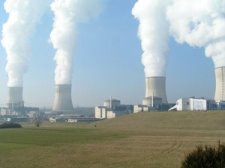 "Britain has 2.3 million cubic metres of nuclear waste stored around the country - more than enough to fill the Albert Hall five times. Exposure to even a tiny amount of the most potent type could kill an adult within two minutes - and it remains lethal for one million years. It will cost £85 billion to bury all this radioactive rubbish - but our governments have dodged the decision of where to put it for 30 years. As Tony Blair takes the first steps towards building ten new nuclear reactors to plug the looming energy gap, shouldn't we clear up this mess first ?" - the Independent.
"Britain has 2.3 million cubic metres of nuclear waste stored around the country - more than enough to fill the Albert Hall five times. Exposure to even a tiny amount of the most potent type could kill an adult within two minutes - and it remains lethal for one million years. It will cost £85 billion to bury all this radioactive rubbish - but our governments have dodged the decision of where to put it for 30 years. As Tony Blair takes the first steps towards building ten new nuclear reactors to plug the looming energy gap, shouldn't we clear up this mess first ?" - the Independent.Alun Ffred Jones, Plaid’s spokesman for economic development, said, "There are too many dangers with nuclear power, such as their potential for being targets for terrorist attacks and the catastrophic consequences of accidents. The Labour Government argues that nuclear power is an environmentally friendly solution for energy generation, but I see nothing environmental about all the nuclear waste that would have to be stored."
But the sensitive issue of dumping of the highly radioactive wastes is still unsolved. The waste disposal should be treated with utmost priority since the nuclear wastes can remain active for many thousand of years. Much of the waste inventory - some 241,000 cubic metres - is classified as intermediate. It is made up mainly of bulky items such as contaminated components of nuclear reactors and the metal casings used to house nuclear fuel rods. High-level waste, which is so radioactive it generates heat, comes mainly from the waste products from reprocessing spent nuclear fuel. It is estimated to total 1,340 cubic metres - just 0.1 per cent of the total waste by volume - yet accounts for 95 per cent of the total radioactivity of the entire waste inventory.
Though nuclear power does not emit carbon dioxide into the atmosphere so chances of air-pollution is much less, but other health and environmental hazards are associated with nuclear energy.
From mining of uranium through fuel processing to waste disposal, the use of nuclear energy involves radioactive material. The effect of nuclear waste can be more disastrous than the conventional environmental pollution. Exposure to radiation can cause genetic mutations, serious illness, and even death. The threat of accidents and the possibility that nuclear materials could get into the wrong hands contribute substantially to public fears about this resource. Even the normal operation of a nuclear power plant creates low-level radioactive waste in the form of ordinary trash, tools, clothing, and other contaminated items that must be carefully isolated from other materials.
Though the nuclear power is clean, and its role in reducing environmental pollution and slowing down climate change shall be acknowledged to promote its further development, but an environment-friendly way should be adopted for the dumping of deadly nuclear wastes.
Nuclear Power is not the answer.